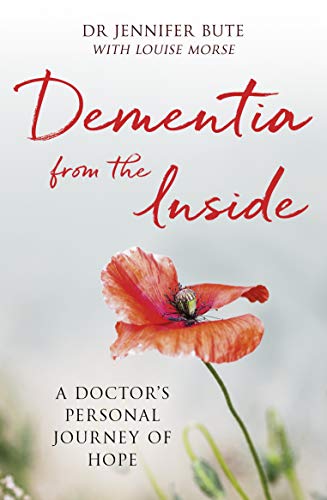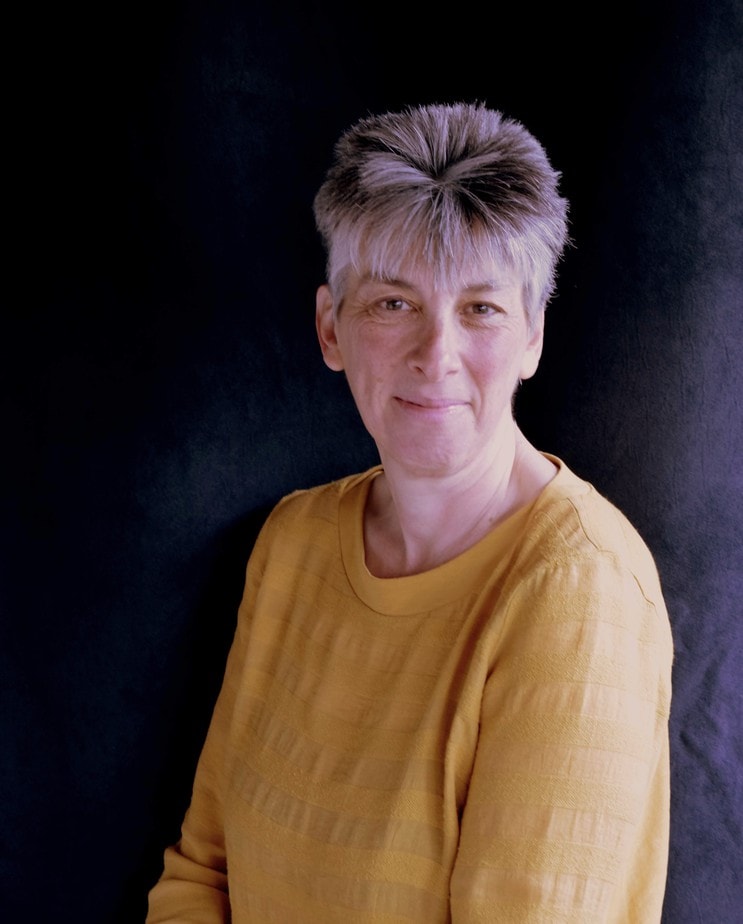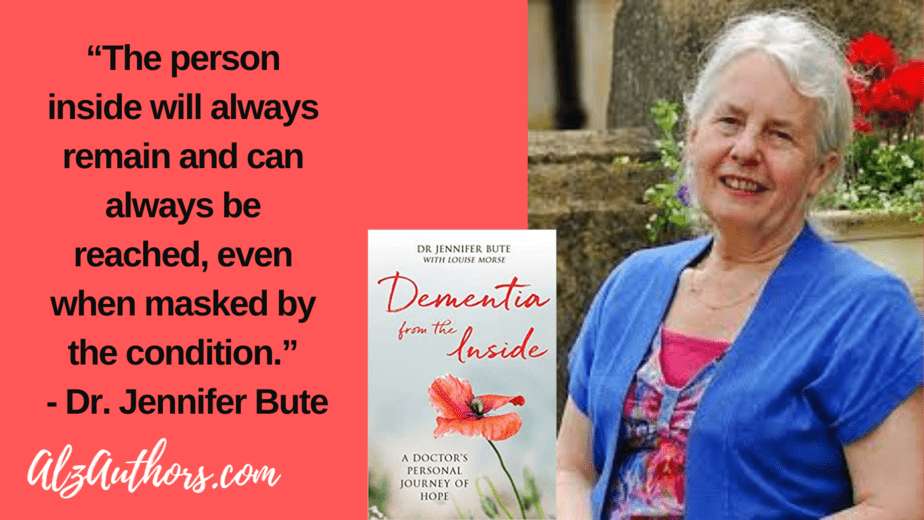AlzAuthors contributor Deb Bunt, author of Slow Puncture: Living Well With Dementia, guest blogs for us in honor of World Alzheimer’s Month. Deb believes it’s essential that those living with dementia tell their stories while they can, and offers suggestions on how to get this done in a trio of blog posts exclusively written for AlzAuthors. Here she shares her discussion with Dr. Jennifer Bute, whose story is told in Dementia From the Inside, written with Louise Morse, and on her blog, Glorious Opportunity. Next week, she’ll report on her interview with Wendy Mitchell and how she tells her story of Young Onset Dementia via her blog, Which Me Am I Today?, and her book, Somebody I Used to Know, written with the help of Anna Wharton. She kicked off this series by telling us her story of working with her friend Peter Berry to help him tell his Alzheimer’s story in Slow Puncture.
By Deb Bunt
Three years ago, I knew virtually nothing about dementia. Now, although my knowledge and understanding have grown, this has almost exclusively been confined to my experiences of being Peter Berry’s friend. I know how to talk with Peter, I have a pretty good understanding of how he functions in terms of his memory issues and when he gets tired. I know when I can laugh at his dementia with him and when he wants me to offer an empathic ear. I know when I can tease him and when I should remain silent. Although Peter and I sit at either end of the scales of his dementia, we have created an equilibrium and it seems to balance out.
But that old saying “when you know one person with dementia, you know one person with dementia” had never been more pertinent than when I chatted with Dr. Jennifer Bute over Zoom.
I have to admit, I was nervous. I didn’t want to patronise Jennifer, to confuse or overwhelm her. Inasmuch as I was familiar with how Peter’s dementia impacted him, I was extremely unaware of how Jennifer’s dementia affected her. Also, if truth be told, I was slightly in awe of someone whom I had only heard talk once, but by whom I had been mightily impressed.[1]
Jennifer Bute, Wendy Mitchell, and Peter Berry have all had their books written in collaboration with someone else. Certainly, in Peter’s case, his story would not have been told had I not been in the right place at the right time to facilitate his wish. I am conscious that telling someone else’s story is a delicate balancing act and yet, without their respective ghost writers, their messages, their emotions, their experiences and, most crucially, their ethos about living with dementia would not have been told. Peter once said that he could get as far as the garden gate, but was unable to push the gate open to access the wider world, and therefore his ability to be heard was restricted to those standing the closest. I was not so sure about Jennifer Bute – was she able to push her own garden gate and, if so, how far was she able to project her voice beyond that gate?
Jennifer was keen to chat, very welcoming, and I gradually relaxed into the interview. What came across strongly was her unrelenting wish to help people. Driven for many years by a desire to help others, this need had not diminished. This was Jennifer’s driver, her motivator, and one of the reasons why she had become a GP. Despite her own dementia, this fire still burned brightly within her and, as far as I could ascertain, would never be snuffed out.
Rather than bemoan her dementia, Jennifer saw it as an opportunity to continue to help others. Of course, there would be challenges, but what was obvious as we chatted was her unshakeable belief that the “person inside remains…” and the condition, whilst affecting that person inside, does not mask it totally.
The Book Journey
Jennifer was surprised when she was contacted by an agency asking if they could write her story. There were subsequently three attempts to do this. Her first biographer appeared to have her own agenda and was using Jennifer’s story to put across her views and to ignore some of the most fundamental parts of Jennifer’s life. Jennifer is a Christian and her faith is key to who she is; she did not want her voiced edited to minimise or remove these beliefs. This issue highlighted the real dangers that exist when someone else is entrusted with your story. There must be mutual trust and empathy, respect and transparency. It was clear this was not the case in this instance. The relationship was terminated, and another writer became available. The writer’s agent’s unexpected ill health meant that the time demands in the contract could not be met. Finally, Louise Morse arrived. And with her came Jennifer’s opportunity to share her story and views.
Most of the factual information in the book was obtained by recording Jennifer’s lectures and talks, but the microphone, which was left on as Jennifer travelled to and from her lectures, also captured her general conversation. This explains the authenticity in the book and why her own voice comes across very strongly. Jennifer’s wish was not so much to have her autobiography written but for her book to be a teaching book with her personal story embedded within it. It is, in short, a book which reflects the very essence of Jennifer (and that is not a perfume, although it sounds as if there might be some marketing scope there.)
The Doctor is Still In
Jennifer still gives lectures and talks; she still uses the internet to convey her ideas in her continued wish to help others. “All people can be helped to improve or to do better in some way,” she said and her activities bear this out. She uses her skills to “stand outside (my) own dementia to analyse it.”
 Dementia from the Inside: A Doctor’s Personal Journey of Hope is Jennifer’s story, told by Louise Morse. Jennifer’s words demand to be heard, her passion to help others is palpable and seemed to cause metaphorical sparks to fly from the screen during our Zoom meeting. Like Peter, using an intermediary to write down her story facilitated its telling. And, like Peter, her views are compelling and she has much to say and to share.
Dementia from the Inside: A Doctor’s Personal Journey of Hope is Jennifer’s story, told by Louise Morse. Jennifer’s words demand to be heard, her passion to help others is palpable and seemed to cause metaphorical sparks to fly from the screen during our Zoom meeting. Like Peter, using an intermediary to write down her story facilitated its telling. And, like Peter, her views are compelling and she has much to say and to share.
Something which particularly interested me, and resonated with Peter’s views, was Jennifer’s strongly held conviction that if you are diagnosed with dementia it is important to continue to be active.
“Fifteen years ago, if you had a stroke,” she said, “you probably wouldn’t get better, you might sit in front of the television or just in your chair. Nowadays, if you have a stroke, you have physiotherapy and you are actively encouraged to get better. It’s the same with dementia. You must keep doing. It’s a bit like Peter and his cycling.”
The Gift Inside Dementia
Jennifer’s constant activities help to slow down the progression of the disease and give her that all important sense of purpose. Given how much dementia can strip away from people, I was surprised to hear her say that her dementia was “a positive thing, a gift to enable (me) to continue to help others.”
Again, this echoes Peter’s views. Peter believes he has achieved more since his diagnosis than he did prior to it. I now had a pattern: two people with dementia saw it as an opportunity. Rather than dementia being a weight, pulling them under, they were treading water in a constant flurry of activity. The life buoy strapped firmly around their bodies and which kept them afloat was their need to be heard.
When Jennifer was first diagnosed, she started to write leaflets to share information. “There was nothing much out there,” she said, “so I decided I should put that right. After all, this is what I had been doing on a professional basis over the latter part of my career.”
Nowadays, she runs memory groups, gives lectures and writes a weekly blog so she can share what she has had “the opportunity and privilege to learn in living amongst so many others with dementia.” Her website is aptly named Glorious Opportunity. All of Jennifer’s activities are designed to help or benefit others. In these strange COVID times where travel has become prohibitively difficult, she is able to do even more now with the increased use of Zoom.
“I am all about helping people do better,” she said, and it was apparent to me, with just this briefest of glimpses into her world, that is exactly what she does. Her voice permeates every leaflet she writes, it resonates in every blog she pens and can be heard in every lecture she gives. As she says, “the person inside will always remain and can always be reached, even when masked by the condition.” The Christian thread running through Jennifer’s voice emphasises the importance of spirituality as cognition becomes limited.
Yes, Louise Morse wrote her book with her but the importance of that book being written with empathy, accuracy and skill is paramount to Jennifer’s voice and her message will continue to reverberate clearly around the dementia world. This is Jennifer’s story, told by another person, but heralding her views and her voice and she will continue to take this “glorious opportunity” to be heard.
[1] I heard Jennifer’s powerful contribution to an AlzAuthors event “Everything You Always Wanted to Know About Dementia… But Were Afraid to Ask,” a virtual Q&A on Zoom.
About the Author
 Deb Bunt is married with two sons and two grandchildren. She’s retired from working as a family practitioner and living in glorious Suffolk, where her days are spent with friends and family, cycling, drinking coffee, eating cake, trying to play Beethoven on the piano and, above all, trying to perfect the skill of “living in the moment.”
Deb Bunt is married with two sons and two grandchildren. She’s retired from working as a family practitioner and living in glorious Suffolk, where her days are spent with friends and family, cycling, drinking coffee, eating cake, trying to play Beethoven on the piano and, above all, trying to perfect the skill of “living in the moment.”
Connect with Deb and Jennifer
Purchase Slow Puncture on Amazon
Glorious Opportunity on Facebook
Purchase Dementia from the Inside on Amazon
Read Jennifer’s AlzAuthors Blog Post
Listen to Jennifer on the AlzAuthors Podcast


